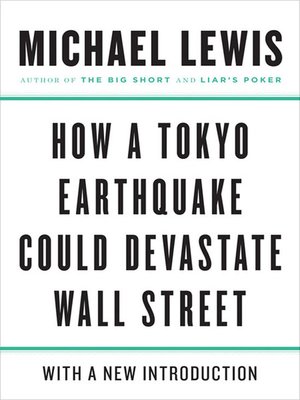
Sign up to save your library
With an OverDrive account, you can save your favorite libraries for at-a-glance information about availability. Find out more about OverDrive accounts.
Find this title in Libby, the library reading app by OverDrive.



Search for a digital library with this title
Title found at these libraries:
| Library Name | Distance |
|---|---|
| Loading... |
In 1989, Michael Lewis reported on the potential effects of an earthquake in Japan on world financial markets. His insights are once again timely, and they are presented here as a stand-alone essay with a new introduction: "Real Versus Imaginary Japanese Earthquakes."
"How a Tokyo Earthquake Could Devastate Wall Street" appears in Michael Lewis's book The Money Culture.







